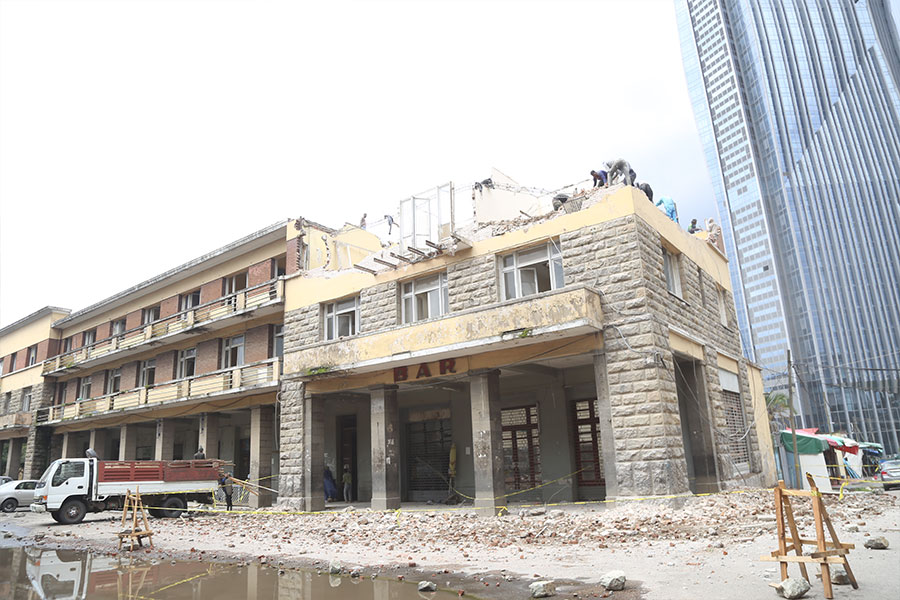
Jun 7 , 2020
By Brook Kebede
Over the past decade, Ethiopia has boasted significant economic growth, averaging around 10pc. This has been possible thanks to several factors including developments in agriculture, services and manufacturing. Most importantly, there has been a boom in the construction industry, which stimulated the economy to become one of the fastest-growing in the world.
Still, Ethiopia has one of the weakest economies in the world, with high rates of unemployment and inflation and stagnant foreign currency reserves. Now, the nation has to contend with the economic challenges unleashed in the wake of the COVID-19 pandemic. It is triggering huge economic disruptions and will result in further unemployment. Protecting the livelihoods of those who work for private enterprises thus needs to be a priority.
This is not to say that the government has not been trying to cushion the impact. Economic response measures have been unveiled with the aim of mitigating negative impacts. The measures have mainly depended on the public health safety steps taken by the government.
For instance, to contain the spread of the virus, the Ethiopian government has closed learning institutions, bars, entertainment centres and banned public gatherings. It has also required that many civil servants work from home.
The restrictions on daily life have led to the closure of many companies and the laying off of staff – either permanently or temporarily. For instance, night clubs and bars in Addis Abeba are currently closed, which means that many of these will inevitably go bankrupt. Since employers are allowed different modalities in how they lay off employees, people working in these places may not have their contracts permanently terminated.
Practically speaking, the effect is the same with termination if the employees are furloughed without pay or there is a large likelihood that businesses under this type of long-term financial stress never recover and permanently close. The impact will all be equally devastating to livelihoods.
The government does provide guidelines on how to deal with private employees when it comes to termination through the Ministry of Labour & Social Affairs (MoLSA) during the pandemic. However, the protocol issued by MoLSA is not binding since it does not have the power of law.
Instead of termination, the protocol advises employers to take alternative measures to freeze any salary increments for the year; suspend all kinds of fringe benefits and allowances; revise existing salary scales; use unutilised annual leave and negotiate on future annual leave and provide loans with a written guarantee. Even if these directives were binding, they will be a far cry from protecting employees from layoffs.
The dilemma the government finds itself in is understandable. On one hand, there are the public health implications of not attempting to mitigate this pandemic. Allowing people to work, travel and perform day-to-day business activities will be a recipe for allowing the virus to transmit exponentially. The number of lives that could be lost will be unimaginable. But restricting the movement of people, which will also constrain the movement of goods, will also be devastating to the economy and the livelihoods of people.
There has to be an alternative solution that will balance these two competing interests: public health and economic well-being. When the Ethiopian government restricted business activity, it should have taken into consideration several variables including the absence of a social security scheme.
Indeed, there have been initiatives to move homeless people into shelters, as we have seen in the northern parts of the country such as Meqelle. Food banks across the country have also gone into overdrive thanks to donations by individuals and businesses that will be instrumental in supporting persons without a salaried income. These kinds of measures are critical to those who will not be able to support themselves or cannot be reached through the government’s economic response measures due to being a part of the informal sector.
The country should solicit funds to take effective and comprehensive financial and economic measures to mitigate the impact of COVID-19 on the labour market. Fortunately, international financial institutions have stepped up.
The World Bank Group has approved 82.6 million dollars for Ethiopia to deal with the health and economic impact of COVID-19. The International Monetary Fund (IMF) has also approved 411 million dollars in emergency assistance to Ethiopia to address the urgent need of the COVID-19 pandemic.
Such financial resources can help the government take measures to mitigate the economic impacts of the virus against employees. It is all the more important that the government continues its lobbying institutions with the goodwill to believe that it is to the benefit of everyone to broaden financial assistance packages.
The government will also need to dig deep into its own pockets and perhaps even print additional money as cash support for lower-income groups. This may worsen inflation but is an acceptable risk to take in an attempt to protect livelihoods and get the economy back on track.
No doubt, private companies have a great role to play in mitigating the impact of COVID-19 on their employees. They may adopt several measures to protect its employees. This could be by providing and disseminating information about health and safety at work and creating the possibility of telecommuting.
Employers may communicate with MOLSA and follow its guidelines closely to ensure that their employees do not get the short end of the stick. To that end, utilising the concept of collective agreements to protect employees would thus be critical.
PUBLISHED ON
Jun 07,2020 [ VOL
21 , NO
1050]


Radar | Mar 30,2019

Radar | Nov 07,2020

Fortune News | Apr 09,2022

Radar | Jul 30,2022

Fortune News | Feb 26,2022

Radar | Jun 08,2019

Sunday with Eden | Apr 10,2021

My Opinion | Jun 17,2023

Fortune News | Jan 13,2024

Fortune News | Oct 01,2022

My Opinion | 131673 Views | Aug 14,2021

My Opinion | 128039 Views | Aug 21,2021

My Opinion | 126001 Views | Sep 10,2021

My Opinion | 123622 Views | Aug 07,2021

Dec 22 , 2024 . By TIZITA SHEWAFERAW
Charged with transforming colossal state-owned enterprises into modern and competitiv...

Aug 18 , 2024 . By AKSAH ITALO
Although predictable Yonas Zerihun's job in the ride-hailing service is not immune to...

Jul 28 , 2024 . By TIZITA SHEWAFERAW
Unhabitual, perhaps too many, Samuel Gebreyohannes, 38, used to occasionally enjoy a couple of beers at breakfast. However, he recently swit...

Jul 13 , 2024 . By AKSAH ITALO
Investors who rely on tractors, trucks, and field vehicles for commuting, transporting commodities, and f...

Jun 28 , 2025
Meseret Damtie, the assertive auditor general, has never been shy about naming names...

Jun 21 , 2025
A well-worn adage says, “Budget is not destiny, but it is direction.” Examining t...

Jun 14 , 2025
Yet again, the Horn of Africa is bracing for trouble. A region already frayed by wars...

Jun 7 , 2025
Few promises shine brighter in Addis Abeba than the pledge of a roof for every family...

Jun 29 , 2025
Addis Abeba's first rains have coincided with a sweeping rise in private school tuition, prompting the city's education...

Jun 29 , 2025 . By BEZAWIT HULUAGER
Central Bank Governor Mamo Mihretu claimed a bold reconfiguration of monetary policy...

Jun 29 , 2025 . By BEZAWIT HULUAGER
The federal government is betting on a sweeping overhaul of the driver licensing regi...

Jun 29 , 2025 . By NAHOM AYELE
Gadaa Bank has listed 1.2 million shares on the Ethiopian Securities Exchange (ESX),...